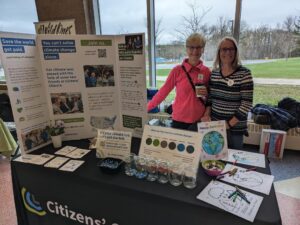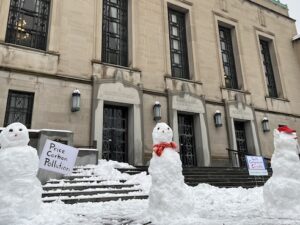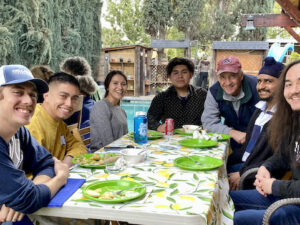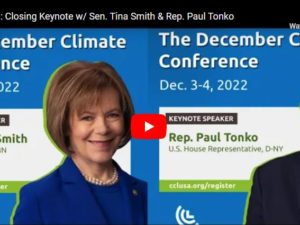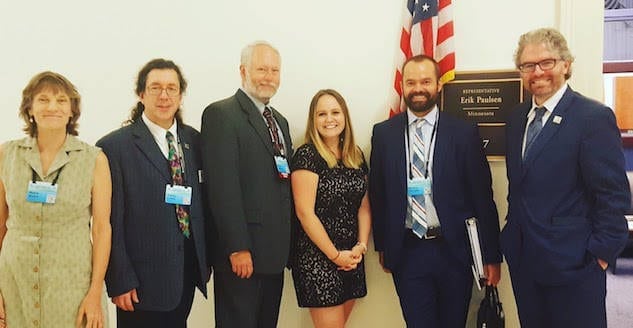
June 2017 lobby meeting with Rep. Paulsen’s office. L-R: Moira Walsh, Tomie Evans, Bruce Morland, Rep. Paulsen staffer, Breene Murphy, Joe Robertson
By Breene Murphy
The Climate Solutions Caucus stands at 78 members, almost 18% of the entire House of Representatives. Within this surge, every member of the Climate Solutions Caucus has his or her own individual story, including the recent member from Representative Erik Paulsen, a Republican from Minnesota.
Citizens’ Climate Lobby has four chapters in Rep. Paulsen’s district—Eden Prairie, Edina, Bloomington, and Chaska. Paul Thompson, the North Wind Regional Coordinator, began a relationship with Rep. Paulsen eight or nine years ago, largely because Paulsen and Thompson are both outdoorsmen and cross-country skiers. Rep. Paulsen came to recognize and be friendly with Paul, even offering fishing tips when seeing him in an REI.
When Minnesota redrew its districts, Paul found himself in Keith Ellison’s district, so Tomie Evans of Edina stepped up as the new local liaison to Rep. Paulsen. Tomie developed relationships with local GOP leaders in their “Pitchers and Politics” events. CCLers in Paulsen’s district have tabled with hundreds of buttons reading, “2.8 million jobs and less CO2 – Ask me how!” They have gathered hundreds of constituent letters to Congressman Paulsen and developed a relationship with his local staff.
Despite the attention from local groups and witnessing the cancellation of the world famous Birkebeiner cross country ski competition due to lack of snow from being rained out, Rep. Paulsen and his team had not taken action on climate action.
The Minnesota teams would have to up their game.
Finding a trusted source
Recent research shows that one of the best ways to help conservatives take action was to make them feel safe. There are many ways to do that, but one may include talking to a trusted source.
CCLer Gary Severson offered Rep. Paulsen a trusted source in the form of Greg Page, the outgoing CEO of Cargill, the largest privately held company in the world and local to the district. They met in April of 2017. Page and Paulsen spoke for a long time, with Gary Severson, Pat Middeke, and Tomie Evans sitting back.
They blew past their 15 minutes because the conversation was so strong, talking about how climate change was adding risks to the growing of food. Page shared three options for mitigating climate risk—subsidies, force (regulations), and price—and said the best way was to let price motivate. He made the point that we don’t want to be in a position of having to tear down and rebuild assets like turkey barns with years of life, which could happen if we delay. Start now, and let replacements happen at the natural end of life for assets.
The meeting only ended when the aide for Rep. Paulsen came to tell him that the car was leaving and he had to go. There was hope.
Persistence during the deliberation
At CCL’s annual conference in Washington, D.C., schedulers make every effort to put citizen lobbyists in meetings with their own representatives. With more than 500 meetings, though, sometimes folks can lobby in districts other than their own. That’s how I came to participate in the Rep. Paulsen meeting with one of his staff members during the June 2017 CCL Lobby Day, led by Tomie Evans.
Partially inspired by Rep. Paulsen’s interest in climate action from Greg Page, Tomie had just taken 60 days paid leave from her employer to focus on her CCL efforts. In D.C., Tomie was supported by Bruce Morland, a Republican mathematician; Moira Walsh, who had done humanitarian work with refugees and was very grateful for Rep. Paulsen’s work to stop sex trafficking; CCL’s Joe Robertson, who lives in Minnesota; and myself, a Southern Californian.
Tomie led Rep. Paulsen’s aide through a quick refresher of the REMI report, highlighting how it would help the local businesses in the district. They also mentioned climate impacts on things Paulsen cared about, like canoeing and cross country skiing.
The aide was knowledgeable, probed with good questions, but did not commit.
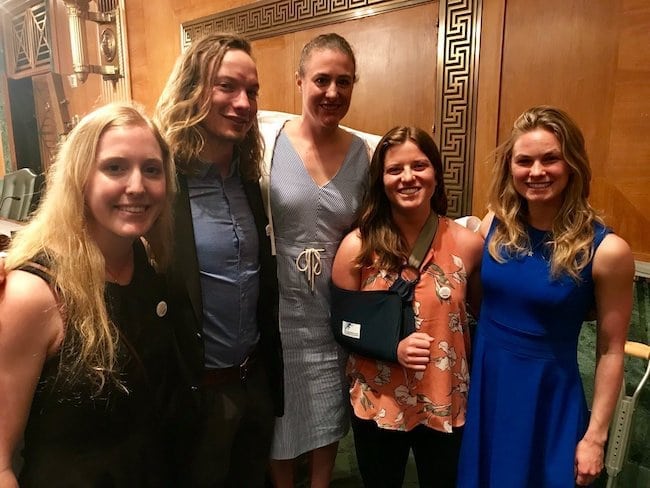
(L-R) Winter Olympians Maddie Phaneuf, David Wise, Stacey Cook, Arielle Gold and Jessie Diggins at a briefing on Capitol Hill.
An Olympic effort to protect winters
In recent years, winters have become so warm that ski and snowboard competitions—like Minnesota’s famous Birkebeiner Cross Country Ski Competition—wouldn’t have been held were it not for man-made snow. Because of this growing threat, the ski industry has become a vocal advocate for climate action. One channel of advocacy is a group called Protect Our Winters (POW).
In Utah, Bill Barron worked closely with POW to have them endorse Carbon Fee and Dividend with our Leader’s Letter. POW is a influential industry group, in part because they have both a CEO Alliance of leading brands in the Action Sports industry who support action on climate change, as well as a Riders Alliance made up of prominent skiers and snowboarders, some of whom are Olympians. Protect Our Winters even participated in a meeting with the Climate Solutions Caucus in September of 2017.
This ignited an idea in Paul Thompson. The Winter Olympics were about to be held, featuring some of America’s best athletes. Could he encourage more Olympians to speak up on climate change?
Paul contacted Jessie Diggins, an Olympic cross-country skier originally from Minnesota, through Facebook. Paul said he knew how busy she was, but considering how important climate action is, he wanted to know if she’d help raise awareness about climate action. To his delight, she responded that she would help, even bringing in the past U.S. Cross Country Ski Team Coach Peter Vandenburg.
Back in Utah, Bill Barron connected CCL’s D.C. staff with Protect Our Winters. The two teams organized a congressional briefing, with Protect Our Winters rallying five Olympians to visit D.C. Those Olympians included cross-country skier Jessie Diggins, gold medal freestyle skier David Wise, halfpipe snowboarder Arielle Gold, biathlete Maddie Phaneuf and alpine skier Stacey Cook. Senator Bennett (D) of Colorado and Senator Collins (R) of Maine hosted the briefing.
The Winter Olympians spoke about how in their lifetime, the quantity and quality of snow had greatly receded, transforming their sport into one that heavily relied on man-made snow, which causes new safety risks and injuries. They shared how glaciers they skied on had receded to a point where chairlifts were exposed to the dirt of mountains. They were losing their sports.
Afterward, the Olympians lobbied several members of Congress later that day. Jessie Diggins met with Paulsen personally and asked him to join the Climate Solutions Caucus.
The CCL difference
Soon after the congressional briefing and Jessie Diggins’ visit, Rep. Paulsen joined the Climate Solutions Caucus. He replaced Rep. Pat Meehan of Pennsylvania. The Minnesota teams read the press release and their excitement grew. Was this really true?
Tomie Evans spoke to Paul Thompson about the news, and like true CCLers, both of them had already started thank you letters to Rep. Paulsen for his work joining the caucus. This is what makes CCL unique: sincere appreciation.
Congratulations to Rep. Paulsen for taking this step, and to the team of CCL volunteers like Tomie Evans, Paul Thompson, Gary Severson, Pat Middeke, Mindy Ahler, and everyone else who helped make this happen.

